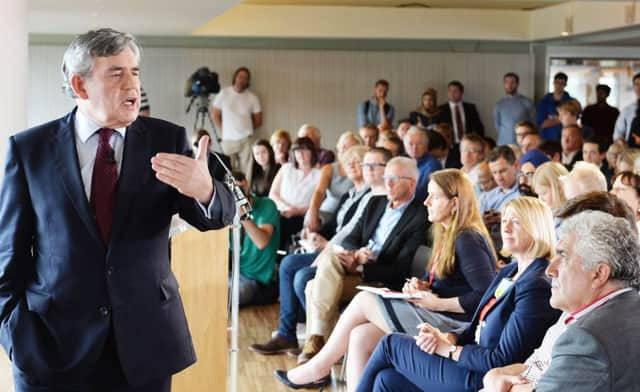Leaders: Brown makes anti-Corbyn case – now what?


In a nuanced address Mr Brown was careful not to make comment on Jeremy Corbyn’s personal credentials to be party leader or indeed to mention him by name. Instead he stressed the dangers of Labour allowing itself to become “a party of permanent protest”, warning that its programme must be “credible” and “electable” if it is to win back power.
The nearest he came to a dig at the left-wing candidate was a powerful plea for realism in foreign policy – a clear retort to Mr Corbyn’s declared wish to be “friends” of Hezbollah.
Advertisement
Hide AdAdvertisement
Hide Ad“I have to say,” Mr Brown declared, “that if our global alliances are going to be alliances with Hezbollah and Hamas and Hugo Chavez’s Venezuela and Vladimir Putin’s Russia, there is absolutely no chance of building a worldwide alliance that can deal with poverty and inequality and climate change and financial instability, and we’ve got to face up to that fact.”
How effective will Mr Brown’s intervention prove? Mr Corbyn has built up a formidable lead. The other three candidates in the field are struggling. They lack the personal magnetism and eloquence that can turn audiences around. And every anti-Corbyn intervention by senior Labour worthies so far seems only to have had the opposite effect to that intended: Mr Corbyn’s lead has strengthened.
However much Mr Brown can speak with authority and resonance about the realities of power and the need for Labour to appeal to voters in the centre ground, it is seen by many in the Corbyn camp as the very politics that have sapped the passion and purpose out of the Labour cause.
Indeed, these warnings from former Labour ministers only feed the sense of all too well-tried and familiar rhetoric from which Mr Corbyn represents a release and escape.
At this late stage, those warnings of the need to work with political realities, the need to govern within constraints and face the challenges of deficit and debt, struggle to be heard by a restless and frustrated audience – one responding only to a radical rejection of the “politics of austerity” and to calls for radical change – albeit back to the rejected policies of the 1980s.
Mr Brown spoke as eloquently as he could without entering into fisticuffs with Mr Corbyn. His speech will give many in the Labour ranks cause for thought and reflection. The question now is whether the many thousands who have recently joined the party are persuadable in this fashion, or whether it is going to take the painful experience of rejection, defeat and a long period of impotent isolation for the truth of Mr Brown’s address to strike home.
Festival realignment proves big draw
Edinburgh looks to be on track for its best-attended festival ever. Ahead of the opening week there had been fears that the realignment of the Fringe to go head-to-head with the start of the official International Festival would impact adversely on ticket sales.
Instead, sales have soared by up to a third at some venues as huge crowds have descended on the city centre. Some promoters were reporting best-ever box office receipts with two weeks still to run.
Advertisement
Hide AdAdvertisement
Hide AdThe alignment of the two festivals for the first time since 1997, together with the absence of competing attractions such as the one-week overlap of the Commonwealth Games last year and the Olympic Games in 2012, has brought a greater concentration of visitors to the capital. It has not been without its frustrations.
The Royal Mile has been best avoided for residents seeking to make business appointments on time. On Friday, traffic in the Cowgate was brought to a near-standstill by mid-morning as delivery lorries struggled to negotiate the festival-goer queues.
In recent years there has been concern as to how the capital can sustain the festivals’ appeal. Yet the crowds seem to be stronger than ever. Indeed, the talk now is of how the festival events can be more widely dispersed across the city rather than focused on a few key areas.
In the meantime, organisers and residents alike can take pride that the festivals are pulling in visitors from home and abroad in ever greater numbers and providing a vital economic boost for the capital.
Given the challenging weather this year, this is surely more welcome than ever.